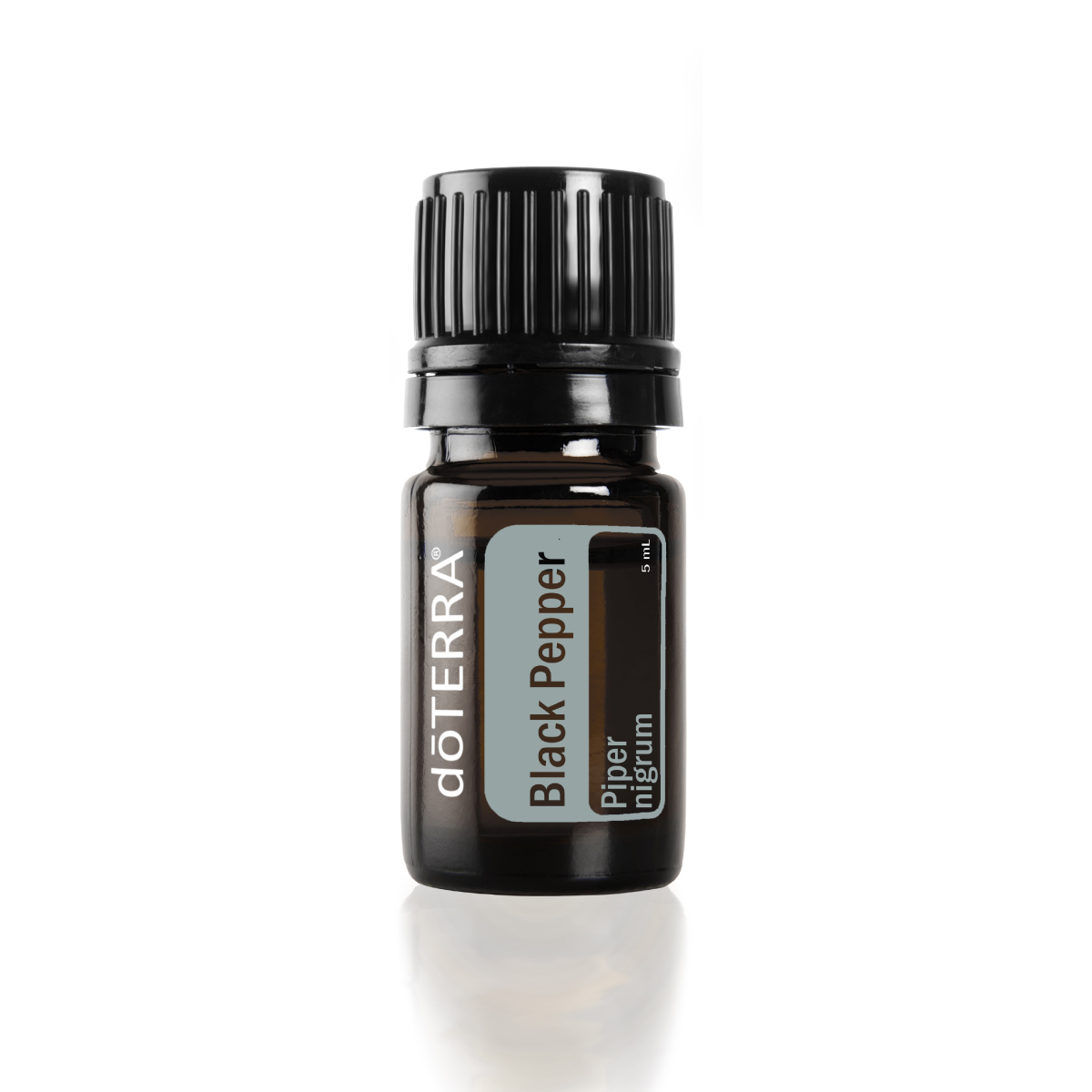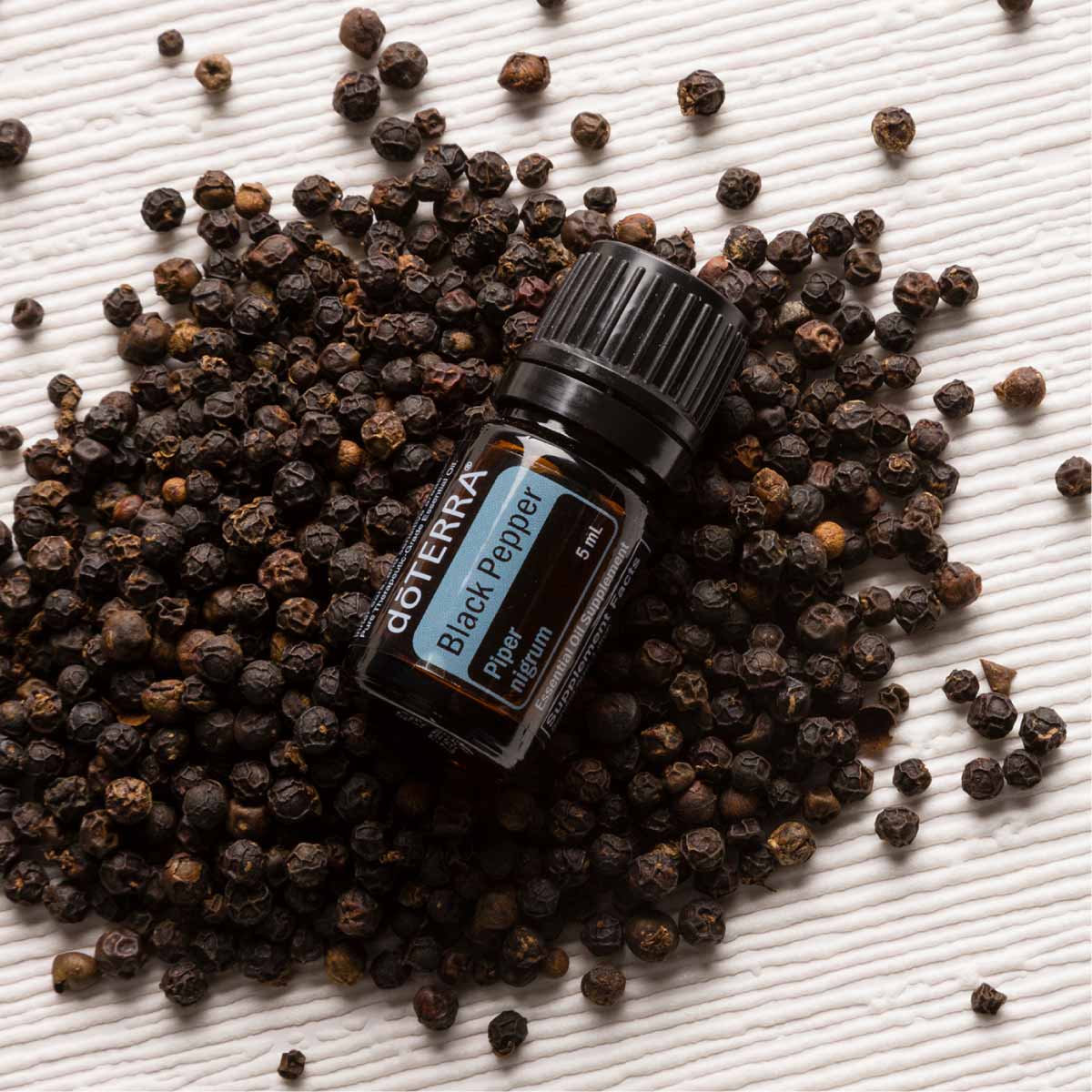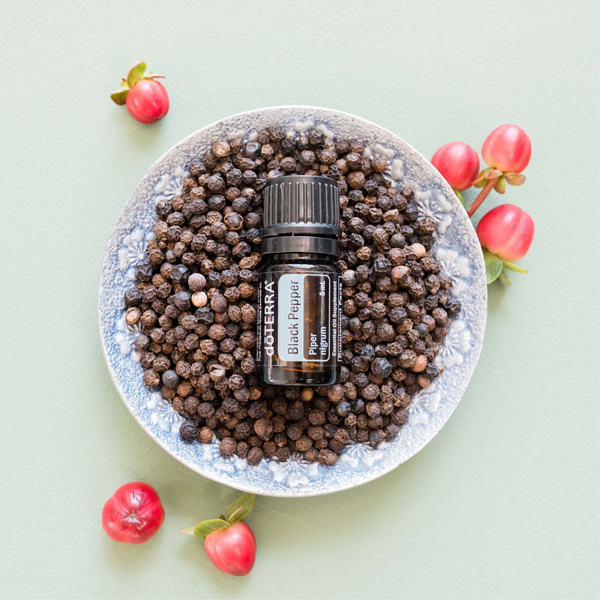Origen: un derivado latino.
Significado "regalo de la tierra."
-
Compra
- Ver Compra Inicio
- Bienestar Fundamental
- Nuevos Productos
- Todos Nuestros Productos
- Aceites esenciales
- Personaliza y Ahorra
- MetaPWR
- Línea Abode
- Cuidado Personal
- Protección Solar
- Suplementos
- Kits y colecciones
- Literatura
- Ofertas especiales
- Difusores y Accesorios
- Productos Elegibles para HSA/FSA
- doTERRA Healing Hands
-

-
Nuestra Historia
- Ver Nuestra Historia Inicio
- Lo que hacemos ...
- Lo que hacemos ...
- Porque lo hacemos ...
-
dōTERRA[doh-teh-ruh]
Black Pepper Essential Oil Uses and Benefits
Essential Oil Spotlight
Essential Oil Spotlight


Black Pepper Essential Oil Product Description
Best known for its ability to spice up meals and enhance the taste of foods, Black Pepper essential oil is a multi-purpose oil that has a variety of uses and benefits. The sharp flavor of Black Pepper makes it an ideal addition to meats, soups, and entrees. However, because of Black Pepper’s powerful chemical components, this essential oil is much more than just a handy spice in the kitchen. Black Pepper essential oil is high in monoterpenes and sesquiterpenes, which are natural chemicals known for their antioxidant activity and their ability to support the immune system when needed most.* When Black Pepper essential oil is orally ingested, a sesquiterpene called caryophyllene helps the body support healthy cell function.* Internal use of Black Pepper essential oil can also promote healthy circulation,* but when used topically, it should be applied with caution due to its powerful warming sensation. Black Pepper essential oil is a diverse oil that provides many physically and mentally stimulating properties essential to promoting human health.

Where to Buy Black Pepper Essential Oil
To buy a bottle of Black Pepper, visit the Black Pepper essential oil product page.
doTERRA’s mission is to share the life-enhancing benefits of the highest-quality essential oils. We achieve this by ensuring all of our essential oils are pure and free of harmful contaminants. Many essential oils available for purchase often contain filler substances or contaminants, and when oils are diluted with impurities, the effectiveness of the essential oil severely decreases. At doTERRA, we want to share the powerful effects of essential oils by providing products that produce their full benefits. In order to guarantee pure essential oils, each batch of oils goes through our CPTG Certified Pure Tested Grade™ protocol. This protocol contains a series of strict essential oils tests that monitor purity and potency of the essential oils. When the essential oils pass the CPTG® protocol, they are then qualified to be sold so that the world can experience the full and life-changing benefits of essential oils.
Black Pepper Essential Oil Uses and Benefits
- One of Black Pepper essential oil’s unique qualities is its ability to provide warm sensations when applied topically. This factor makes it a perfect oil to use in a relaxing massage blend. Create your own warming and soothing massage blend by combining one to two drops of Black Pepper essential oil with a carrier oil. Using Black Pepper essential oil in a massage blend not only provides warm sensations during a massage, its aromatic components also help enhance your relaxing experience.
- Need a good way to calm unwanted nerves? Black Pepper is a great way to relieve anxious feelings. When used aromatically, Black Pepper essential oil can help soothe tightened emotions. To relieve yourself of anxious feelings, place a few drops of Black Pepper essential oil into a diffuser or inhale it directly to receive its aromatic benefits.
- Black Pepper is a powerful essential oil with amazing uses and benefits. With the right combination of essential oils, its effects can be amplified. When you combine Black Pepper essential oil with Juniper Berry oil and/or Cedarwood oil, it can help produce a calming and grounding effect on your senses and emotions, and can help you destress and relax.
- Preparing a delicious barbeque for your friends or family? Don’t forget to use Black Pepper essential oil. For an unforgettable steak, try adding a drop of Black Pepper to your steak marinade. This well-known spice can add a zing to your steak that will have the whole family wanting to know your marinade’s secret ingredient.
- After a peaceful afternoon nap, it’s not uncommon to wake up feeling groggy or maybe even more tired than you were before you dozed off. In instances like this, Black Pepper essential oil is a great oil to have. After an afternoon nap, apply a few drops of Black Pepper oil to the bottom of your feet for a stimulating wake up. The warming sensation of Black Pepper will provide you with the boost you need to transition from your sleepy state to a ready-to-go mentality.
- Black Pepper essential oil contains many natural chemicals that are important in supporting natural functions of the body. Some of these chemicals include monoterpenes and sesquiterpenes, which are known for their antioxidant activity when ingested.* To provide your body with greater antioxidant support, put one or two drops of Black Pepper oil into a Veggie Capsule and take internally.
- Experiment in your kitchen by using Black Pepper essential oil in your next dish. Black Pepper essential oil is flavorful and can provide a burst of spice that will elevate a variety of different home cooked meals. Try adding Black Pepper oil to your meats, soups, or entrees to enhance food flavor and produce delicious results your taste buds will not easily forget. Or try combining Black Pepper with Clove oil and/or Cilantro oil to give your next meal a hint of spice.
- Sometimes a walk in the fresh, crisp air of winter is just what the soul needs. Make sure to prepare correctly for your chilly stroll by using Black Pepper oil. Apply one drop of Black Pepper essential oil to a carrier oil and apply to the bottom of your feet before you take your winter walk. Black Pepper’s chemical makeup allows for a warming sensation to overcome the area where it has been applied topically. Keep your feet warm by using Black Pepper oil on your feet. Taking a drop in water or a Veggie Capsule may also help support healthy circulation.* This essential oil is an ideal companion for a comfortable and refreshing seasonal walk.
- Enjoy your favorite seasons with good health by using Black Pepper essential oil. Because Black Pepper has certain natural chemicals such as monoterpenes and sesquiterpenes, it can support the immune system when needed most.* To better protect your health, take one to two drops of Black Pepper oil in a Veggie Capsule when seasonal threats are high.*
Fun Fact
In ancient Greece and Rome, black pepper was extremely popular and was even used as a medium of exchange.1
Plant Description
Native to India, the black pepper plant is a climbing vine that can grow up to 10 meters high. The stem of the black pepper plant grows into a plentiful green column as the many shoots that grow from the stem begin to produce green, almond-shaped leaves. Growing next to these luscious leaves are clustered flowers and the fruit of the plant—the peppers. The peppers, or fruits, are round and can grow to be approximately 6 mm in diameter. These fruits turn from green to red and are picked at various times of their ripening stages to produce varying types of peppers. In order to produce black pepper, these tiny and rotund fruits are typically picked when they are fully grown, shiny, and green.2


Chemistry of Black Pepper Essential Oil
Main Chemical Components: Caryophyllene, limonene, carene, sabinene
Black Pepper essential oil contains a high amount of natural chemicals that can support and protect the human body. Some of the most prominent chemicals are monoterpenes and sesquiterpenes, which are known for their antioxidant activity when ingested.* These chemicals also help support the immune system.* Additionally, one of the sesquiterpenes found in Black Pepper is caryophyllene. The doTERRA Science Blog explains how this caryophyllene chemical can be extremely crucial to the body because of its ability to support healthy cell function when ingested orally.* The chemical makeup of this highly regarded spice makes Black Pepper an effective and impactful essential oil. To learn more about the chemical components of Black Pepper or other essential oils, visit the doTERRA Science Blog.
Oils that Blend Well with Black Pepper Essential Oil
Black Pepper essential oil blends well with Bergamot, Clary Sage, Frankincense, Geranium, Lavender, Clove, Juniper Berry, Sandalwood, and Cedarwood essential oils for diffusion.
Cautions
Possible skin sensitivity. Keep out of reach of children. If you are pregnant, nursing, or under a doctor’s care, consult your physician. Avoid contact with eyes, inner ears, and sensitive areas.
References
-
Copiado al Portapapeles
- Descargar

